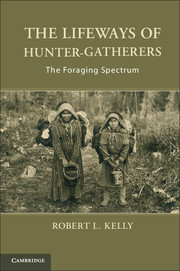Book contents
- Frontmatter
- Contents
- Tables
- Figures
- Preface
- Acknowledgments
- One Hunter-Gatherers and Anthropology
- Two Environment, Evolution, and Anthropological Theory
- Three Foraging and Subsistence
- Four Mobility
- Five Technology
- Six Sharing, Exchange, and Land Tenure
- Seven Group Size and Demography
- Eight Men, Women, and Foraging
- Nine Nonegalitarian Hunter-Gatherers
- Ten Hunter-Gatherers and Prehistory
- Notes
- References
- Index
Ten - Hunter-Gatherers and Prehistory
Published online by Cambridge University Press: 05 April 2013
- Frontmatter
- Contents
- Tables
- Figures
- Preface
- Acknowledgments
- One Hunter-Gatherers and Anthropology
- Two Environment, Evolution, and Anthropological Theory
- Three Foraging and Subsistence
- Four Mobility
- Five Technology
- Six Sharing, Exchange, and Land Tenure
- Seven Group Size and Demography
- Eight Men, Women, and Foraging
- Nine Nonegalitarian Hunter-Gatherers
- Ten Hunter-Gatherers and Prehistory
- Notes
- References
- Index
Summary
I want to talk only about proper things, old time.
Annie Ned, Athapaskan (Cruikshank 1990: 323)One of the final questions posed at Man the Hunter was “Are the hunter-gatherers a cultural type?” (Lee and DeVore 1968: 335). A half-century later, we are still asking that question. Harvey Feit suggests the answer is no: “a universal concept of socially distinctive hunter-gatherer societies may not be a credible anthropological category” (1994: 422; see also Burch 1994a: 452). Indeed, why should we expect any category imposed on the continuous diversity of humanity to have neat and tidy boundaries?
And yet, the category of hunter-gatherer continues to be one that anthropologists give special significance. The reason is that like our intellectual forebears, we seem overwhelmed by “the fact that hunter-gatherers appear to be the most ancient of so-called primitive societies – [by] the impression that they preserve the most archaic way of life known to humanity, that characteristic of the whole of the Palaeolithic” (Testart 1988: 1; emphasis added). This impression leads many anthropologists, even those familiar with the diversity of foraging societies, to seek a glimpse of the past in the present. Leacock and Lee (1982b: 1) suggested that we study foragers to know “What was human social life like when people lived directly from the fruits of the earth?” (1982b: 1). Alain Testart claimed that “structures and social forms analogous to those observed in Australia were probably present in Palaeolithic societies.” He recommends that
if we seek to know about the past, a field of study that has never seemed dishonourable to any discipline other than social anthropology, the point of departure should be hunter-gatherers in favourable regions, hunter-gatherers who might not have been such and probably remain such only by reason of restrictive social forms that for them are quite possibly a distant and glorious heritage. (Testart 1988: 12–13)
- Type
- Chapter
- Information
- The Lifeways of Hunter-GatherersThe Foraging Spectrum, pp. 269 - 276Publisher: Cambridge University PressPrint publication year: 2013

